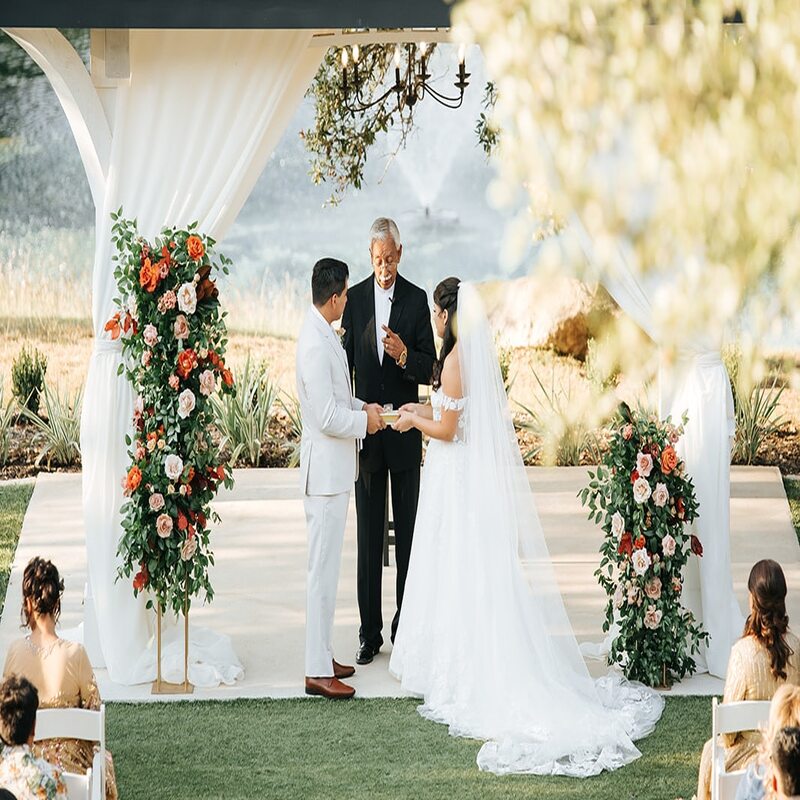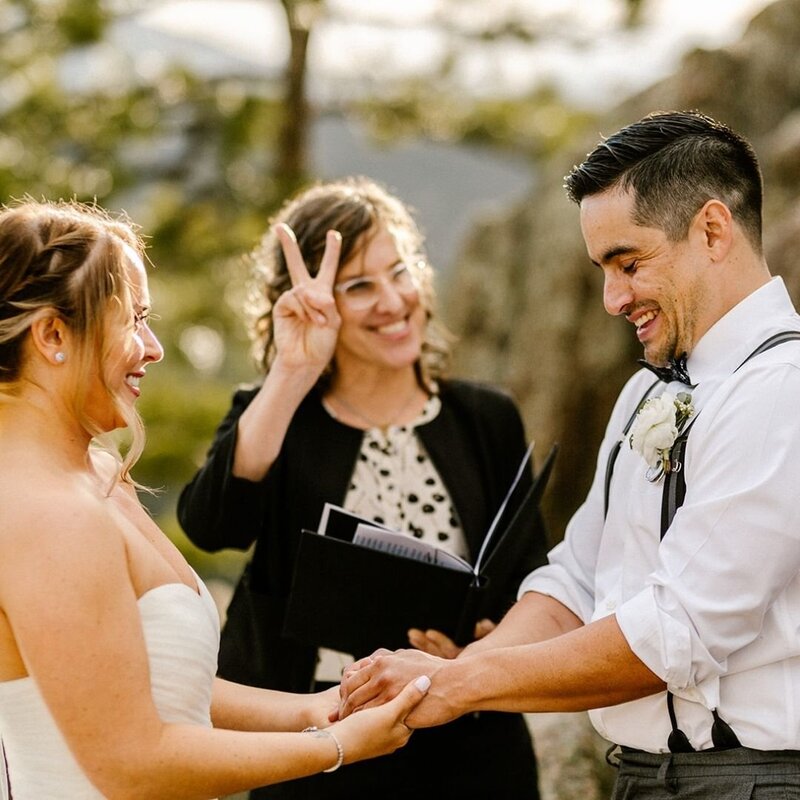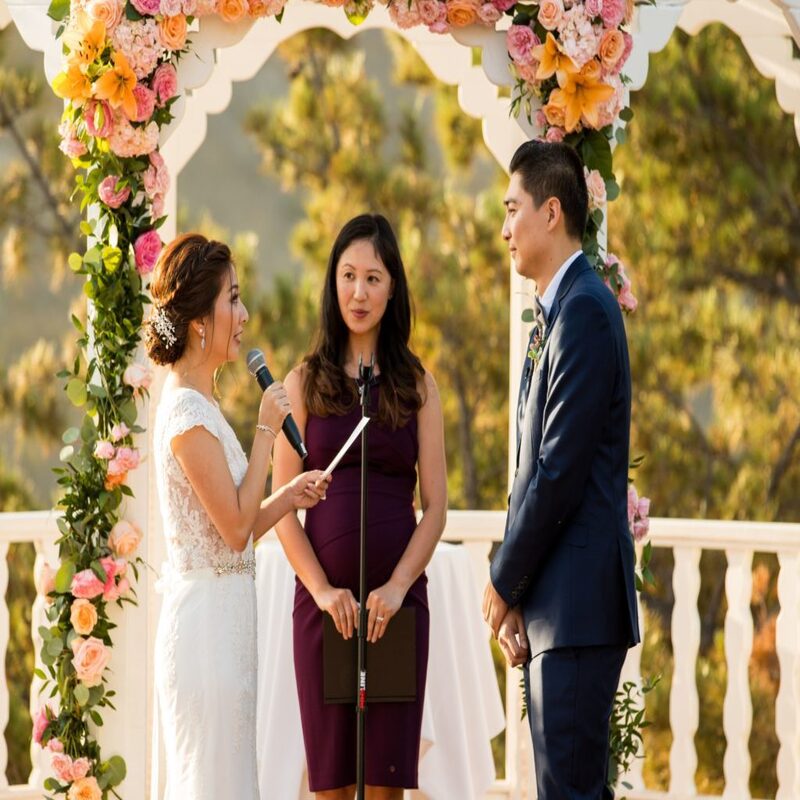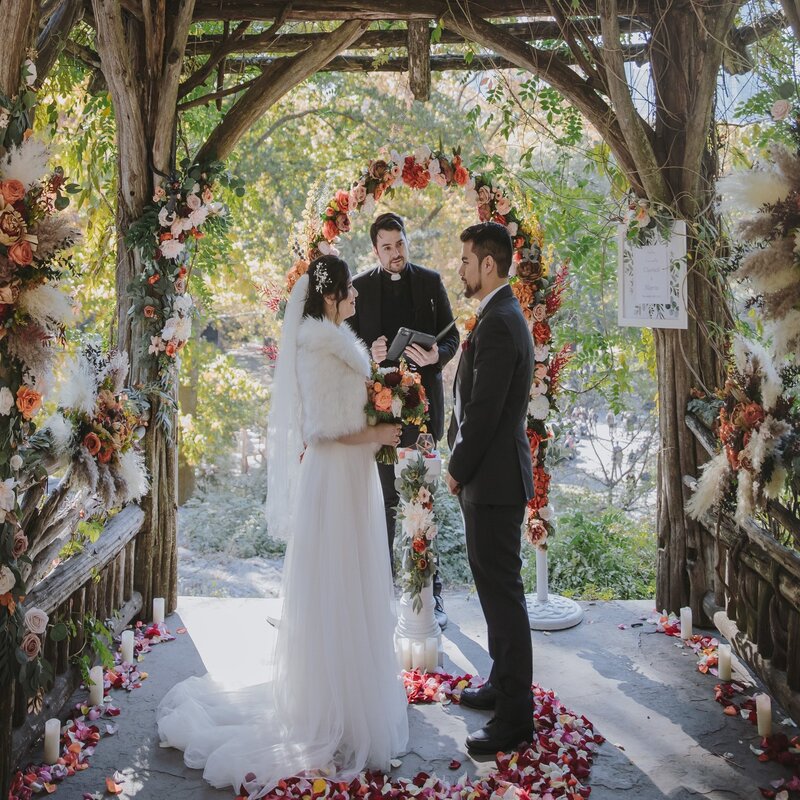Introduction to Wedding Officiants
When you begin planning your wedding, understanding the role of a wedding officiant is key. A wedding officiant is crucial in not only conducting your ceremony but also ensuring its legality. This person can be anyone from a family member to a professional with experience in performing weddings. With over 400,000 wedding officiants in the United States, options are vast. This creates the need for some clarity on what wedding officiants do and what they are not authorised to do.
Wedding officiants come with different titles and roles. They might be religious leaders like priests or rabbis, or civil representatives like judges or court clerks. What is a wedding officiant if not someone who can legally bind you and your partner in marriage? That’s exactly what they are, and it’s why their role is so vital. They carry the responsibility of ensuring that your marriage is recognized by the law. Beyond legality, they also contribute significantly to the tone and spirit of your ceremony.
Choosing the right officiant can greatly influence the feel of your wedding day. They can create a ceremony that resonates with your values, beliefs, and love story. In this blog, we will dive into the roles and responsibilities of officiants, the clear differences between religious and civil officiants, the legal requirements they must meet, and offer guidance on how to find the right one for your ceremony. It’s not merely about making it official; it’s about making it your own, special moment. Remember, the right wedding officiant will guide you through the process and help create a ceremony that reflects your unique relationship.

Roles and Responsibilities of a Wedding Officiant
A wedding officiant’s role is diverse and crucial for your special day. They do more than just lead the ceremony; they ensure it’s legal. An officiant works with you to craft a ceremony that reflects your values. They guide you through writing vows and selecting readings.
An officiant oversees the ceremony’s flow, from procession to pronouncement. They also handle the legal documents to validate your marriage. A professional officiant can even offer counsel on wedding etiquette and traditions.
Their responsibilities span from consultation before the wedding to filing paperwork after. An officiant’s duties are to reflect your wishes and maintain the ceremony’s legal integrity. They are the guide that helps you navigate the intricacies of your ceremony. Their goal is to create a memorable experience that is uniquely yours. In short, they are integral in transforming your wedding vision into reality while upholding legal formalities.
Religious vs Civil Wedding Officiants
When choosing your wedding officiant, you must understand the two main types: religious and civil. Religious officiants are ordained by a religious group. This could be a priest, pastor, rabbi, imam, or other religious leaders. They perform wedding ceremonies within their faith traditions. Usually, they incorporate spiritual beliefs and sacred rituals into the ceremony.
Civil officiants, on the other hand, are legally recognized by the government. They include judges, court clerks, or other officials. Civil officiants conduct secular ceremonies without religious elements. These ceremonies focus on legal aspects and personal vows of the couple.
The choice between a religious or civil officiant depends on your beliefs and the type of ceremony you desire. With a religious officiant, expect your ceremony to follow religious customs. They will likely require you to participate in pre-marital counseling or religious classes.
Civil officiants offer more flexibility. They can perform ceremonies at various locations and tailor the script to your preferences. If you want a non-religious ceremony that reflects personal beliefs, a civil officiant is a good option.
Some states in the U.S. lean towards religious ceremonies. They make it easier for religious officiants to gain legal authorization. In such states, secular or civil ceremonies may face stricter rules. It’s important to check local laws about who can legally marry you.
Choosing between a religious or civil wedding officiant is a personal decision. It should align with your values and the vision for your special day. Your officiant plays a key role, whether they’re blessing your union in a sacred way or celebrating your love in a secular manner.

Legal Requirements for Wedding Officiants
Understanding the legal requirements for wedding officiants is crucial. These requirements ensure that your marriage is recognized by law. The regulations vary by location, so it’s important to research local laws when planning your wedding.
In many places, officiants must have legal authority to conduct a wedding. This means they must be recognized by a government or religious institution. Without this, the marriage may not be legal.
For religious officiants, the process often involves ordination. This authorization comes from their religious organization. Civil officiants, in contrast, receive their authorization from the state or local government. They do not need a religious affiliation to conduct a wedding.
Some states require officiants to register with the local government. Others might demand proof of ordination or affiliation. These rules can change from one place to another. It’s key to confirm these details well before your wedding date. The officiant might need to complete specific paperwork or meet other requirements. Some areas have more strict rules, especially for civil ceremonies.
Officiants who are friends or family may need to obtain a one-time authorization. This often involves a simple process through a government or online organization.
Remember, the person overseeing your wedding must be legally recognized in the location of your ceremony. This is essential to ensure your marriage is valid. Make sure to check these requirements early in your planning process.
To sum up, the legal requirements for a wedding officiant cover authorization and recognition. They must have the power to marry you legally. They should also understand and follow local laws and regulations. This is to make sure your ceremony is not only special but also legally sound.
How to Find the Right Wedding Officiant for Your Ceremony
Finding the right wedding officiant is a personal and significant decision. Begin by considering the ceremony type you desire. Do you envision a religious or secular setting? Your answer will guide your search for an officiant. Here are steps to find the perfect match for your special day:
- Research Local Officiants: Start with an online search to identify officiants in your area. Use keywords like ‘wedding officiant’ and add your location.
- Check Credentials: Ensure they have legal authority to marry you. Verify their registration with local government or religious institutions.
- Read Reviews: Look for feedback from other couples. Reviews can give insight into an officiant’s style and professionalism.
- Interview Candidates: Meet potential officiants to gauge chemistry. Evaluate their communication skills and comfort level with your ceremony ideas.
- Discuss Ceremony Styles: Make sure they are willing to tailor the ceremony to your preferences. Share your vision and see if their approach aligns.
- Confirm Availability: Check if they are available on your wedding date. Also, inquire about their fees and what services they include.
- Understand Legalities: Ask about the documentation process. They should know how to handle marriage licenses and legal filings correctly.
- Personal Connection: Choose someone who resonates with you. A strong personal connection will help make your ceremony more meaningful.
Remember to start your search early. This will give you ample time to find the right fit and avoid last-minute stress. The right wedding officiant will ensure your marriage is not just legal but also a reflection of your unique relationship and love story.
Importance of Selecting a Compatible Officiant
Selecting a compatible wedding officiant is crucial for your ceremony’s success. This person will set the tone for one of the most significant days of your life. Therefore, their alignment with your vision and values cannot be overstated. A wedding’s atmosphere often reflects the officiant’s personality and approach. You want an officiant who understands your story and can convey it authentically.
A compatible officiant ensures that your ceremony feels unique and personal. They should share or respect your beliefs and customs. This is important whether your ceremony is religious, secular, or a blend of traditions. An officiant’s ability to connect with you and your partner makes the experience more engaging for everyone involved.
Moreover, a good match goes beyond the ceremony itself. They guide you through legal formalities and paperwork. Their role is to navigate the process smoothly, avoiding stress for the couple. Proper legal acknowledgment of your marriage is as important as the emotional resonance of your vows.
Remember, a ceremonious and legal union sets the foundation for your future. Finding an officiant you click with gives you confidence and peace of mind. It allows you to focus on the joy and celebration of your special day. Take time to find someone who fits well with you and your partner. It can make all the difference in creating a memorable and meaningful wedding experience.

Questions to Ask Potential Wedding Officiants
Once you’ve narrowed down your list of potential wedding officiants, it’s important to ask the right questions. These inquiries will help you decide who’s the best fit for your ceremony. Here’s a list you can use in your interviews:
- Experience and Specialization: How many weddings have you officiated? Do you specialize in certain types of ceremonies?
- Personalization: Can we customize our ceremony? How do we incorporate our personal touches?
- Legal Knowledge: Are you familiar with our state’s marriage laws? How do you handle the legal paperwork?
- Availability: Are you available on our wedding date? What is your cancellation policy?
- Ceremony Logistics: What is your process for planning and conducting the ceremony?
- Fees and Services: What are your fees? What services do they include?
- Rehearsal: Do you attend the wedding rehearsal? Is this included in your fee?
- Communication: How will we communicate? How often will we meet or talk?
- Backup Plan: Do you have a backup if you cannot make it to the wedding?
- References: Can you provide testimonials from previous couples you’ve worked with?
Your officiant plays a critical role in your wedding, so take the time to ask these questions. This will ensure that your wedding officiant is not only qualified but also the right match for you and your partner. Choosing the right person to officiate your wedding is key in making your day memorable and tailored to your unique love story.
Finalizing Your Choice and Preparing for the Big Day
Once you’ve considered all the factors, finalizing your choice of wedding officiant comes next. This step is as vital as selecting the venue or dress, because it seals who will oversee your legal and emotional union. To make this final decision easier, reflect on the interactions you had with potential officiants. Who made you feel the most understood? Whose vision for the ceremony resonated with you both?
After choosing your officiant, it’s time to prepare for the big day. Schedule meetings or rehearsals to discuss ceremony details. Clarify any last-minute questions and confirm the schedule. Make sure they understand your wishes for the ceremony’s structure and content.
Check the legal paperwork with your officiant one more time. This ensures all is set for your marriage to be lawfully recognized. Have a clear plan for the signing and filing of the marriage license. Knowing these details are handled allows you to focus on celebrating your love.
Prepare a backup plan with your officiant in case of unexpected events. This helps avoid last-minute panic and ensures your day runs smoothly. Finally, remember to enjoy this journey. Your wedding is a celebration of your unique love story. With the right officiant, your ceremony will be a cherished memory for years to come.
